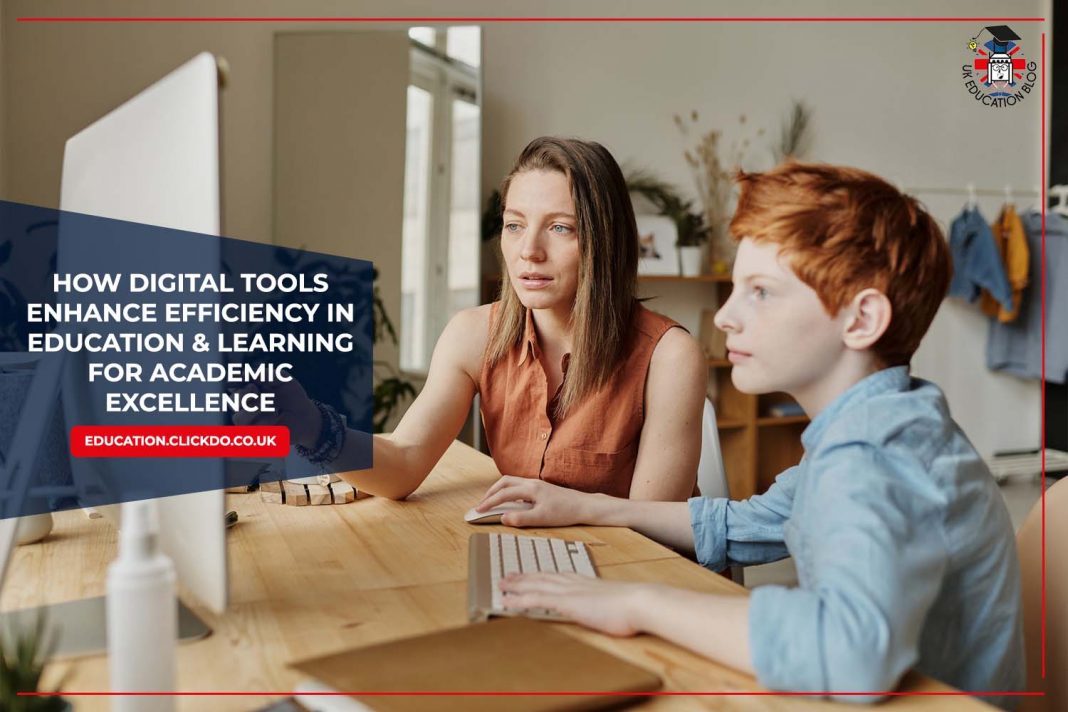In the era of rapid digital transformation, academia isn’t left untouched.
Integrating innovative digital tools is dynamically shifting the education landscape, fostering efficiency, and driving academic excellence.
This evolution transcends the confines of traditional classrooms, facilitating personalised learning, effective communication, and fruitful collaboration in an increasingly connected world.
Furthermore, these tools have made learning more accessible, breaking down geographical barriers and opening the gates to a world of knowledge just a few clicks away.
This article aims to navigate the digital world of academia, showcasing the array of tools available to reach the pinnacle of academic success.

Enhancing Productivity With File Management Tools
Managing and organising files can often be a stumbling block in pursuing academic excellence. Digital tools like Smallpdf’s compress PDF services, Dropbox, and Google Drive can streamline this process. The compressed PDF tool helps students handle large files efficiently.
Alongside this, cloud storage services like Dropbox and Google Drive provide secure storage and easy access to files from anywhere, anytime. These tools optimise file management, thus saving valuable time and enhancing productivity. They alleviate the stress associated with data loss and facilitate better organisation, contributing significantly to academic success.
Bridging The Gap With Learning Management Systems
Learning Management Systems (LMS) like Moodle, Canvas, and Blackboard are revolutionising how education is imparted. LMS software is more than just a digital platform; it bridges educators and learners, fostering a highly interactive learning environment. Students have access to a wealth of learning resources, can track their progress, interact with their peers, and receive timely instructor feedback.

Furthermore, these systems provide an organised framework for both synchronous and asynchronous learning, accommodating the different paces at which students learn. For instructors, these platforms serve as a hub for curriculum planning, student engagement monitoring, grading streamlining, and lesson customisation, thus ensuring a holistic approach to diverse learning styles.
The Rise Of Online Research Tools
With the wealth of online information, sifting through irrelevant content to find the desired academic material can be quite daunting. This is where online research tools like Google Scholar, JSTOR, and ResearchGate come in. These digital tools offer extensive databases of scholarly articles, e-books, thesis papers, and more, serving as a treasure trove of academic resources.
They allow students and academics alike to conduct thorough, streamlined research, cross-reference sources, and find the most recent and relevant scholarly publications. Furthermore, these tools promote academic integrity by facilitating proper citation and referencing, fostering a culture of responsible scholarship. The simplicity and accessibility of these tools have made them indispensable in the academic world.
Interactive Learning With Educational Apps
The explosion of educational apps and games is making learning more interactive and engaging than ever. Apps like Duolingo, Khan Academy, and Photomath facilitate self-paced learning, enabling students to explore subjects and hone their skills outside the confines of a classroom. These apps come with gamification features that make learning fun and stimulating, driving student participation, and enhancing their grasp of the subject matter.
Furthermore, these tools provide real-time performance feedback, allowing students to track their progress and work on their areas of improvement. As a complement to traditional education, they cater to various learning styles and preferences, promoting inclusivity in education and making learning enjoyable.
You can find useful apps for curriculum subjects such as Math apps, STEM apps, or geography apps for more targeted learning.
Collaborative Learning With Communication Tools
With the rise of distance learning, communication tools like Microsoft Teams, Zoom, and Google Meet have become essential. These digital platforms foster collaborative learning by enabling students and teachers to communicate and collaborate in real-time. They come with many features, such as shared screens, breakout rooms, and interactive whiteboards that facilitate group discussions, presentations, and collaborative projects.

Moreover, they open the doors to global schooling and learning communities, fostering a multicultural educational experience. Additionally, these tools offer flexibility in scheduling and attending classes, balancing academics and other commitments, thereby reducing stress among students.
Online Assessment Tools For Effective Evaluation
Evaluation is a critical aspect of the learning process. It provides insight into a student’s understanding and retention of the subject matter. Online assessment tools such as Quizlet, Kahoot, and Socrative are streamlining this process. These platforms allow educators to create custom quizzes, flashcards, and interactive games to test knowledge and track student progress. Using multimedia in these tools makes the assessment process engaging and less intimidating.
Furthermore, their instant feedback features offer students insights into their strengths and areas for improvement, promoting a growth mindset and fostering self-improvement. With these tools, assessments become more than just a measure of learning; they become a pathway to academic excellence.
Digital Note-Taking: Streamlining Information Capture
Taking notes is an integral part of the learning process, and digital tools are transforming this traditional activity into an efficient, organised process. Applications like Evernote, OneNote, and Google Keep allow students to easily create, organise, and search through notes. They support multimedia notes, allowing for more comprehensive note-taking that suits different learning styles.

They also sync across multiple devices, ensuring that your notes are accessible wherever you are. Furthermore, these apps offer features like sharing capabilities and collaborative note-taking, making group studies more effective. With these digital tools, note-taking becomes more conducive to retaining information and promoting active learning.
E-books And Online Libraries: Expanding Access To Knowledge
Access to relevant reading material is crucial for academic success. Digital resources like e-books and online libraries, such as Project Gutenberg and the Open Library, offer a comprehensive array of literature at your fingertips. These platforms provide convenient access to vast collections of books and journals and feature tools for annotation, highlighting, and bookmarking, enriching the reading experience.
These platforms break down geographical and time constraints, providing 24/7 access to resources. This digital transformation of reading expands access to knowledge, fostering a culture of continuous learning and intellectual curiosity.
The Future Of Education with Digital Tools
In a rapidly evolving digital landscape, using digital tools in education is no longer a luxury but a necessity. These tools are revolutionising how students learn and teachers teach, enhancing efficiency and stimulating academic excellence. From the convenience of Learning Management Systems to the engaging potential of VR, each tool plays a pivotal role in fostering a more comprehensive, accessible, and personalised learning experience.
The future of education lies in embracing these technological innovations, making learning more dynamic and adaptive to the needs of the digital native generation. Integrating digital tools into education provides an exciting roadmap for academic excellence. As we move forward, educators and students alike must harness the power of these tools, preparing for a future where technology and education are intrinsically linked. The journey toward academic excellence, in essence, is a digital one.
Author Profile

- Editor in Chief
- Blogger and Educator by Passion | Senior Online Media & PR Strategist at ClickDo Ltd. | Contributor to many Education, Business & Lifestyle Blogs in the United Kingdom & Germany | Summer Course Student at the London School of Journalism and Course Instructor at the SeekaHost University.
Latest entries
 schoolingJanuary 23, 20265 Essential Skills for Managing Teaching Teams in Schools
schoolingJanuary 23, 20265 Essential Skills for Managing Teaching Teams in Schools Directory PostsOctober 29, 20257 Not-To-Miss UK Education Conferences in 2026
Directory PostsOctober 29, 20257 Not-To-Miss UK Education Conferences in 2026 Directory PostsOctober 16, 2025The 12 Best Online Tutoring Platforms in the UK
Directory PostsOctober 16, 2025The 12 Best Online Tutoring Platforms in the UK Directory PostsOctober 6, 2025Top 12 London Private Schools – Best Independent Schools Nearby
Directory PostsOctober 6, 2025Top 12 London Private Schools – Best Independent Schools Nearby







